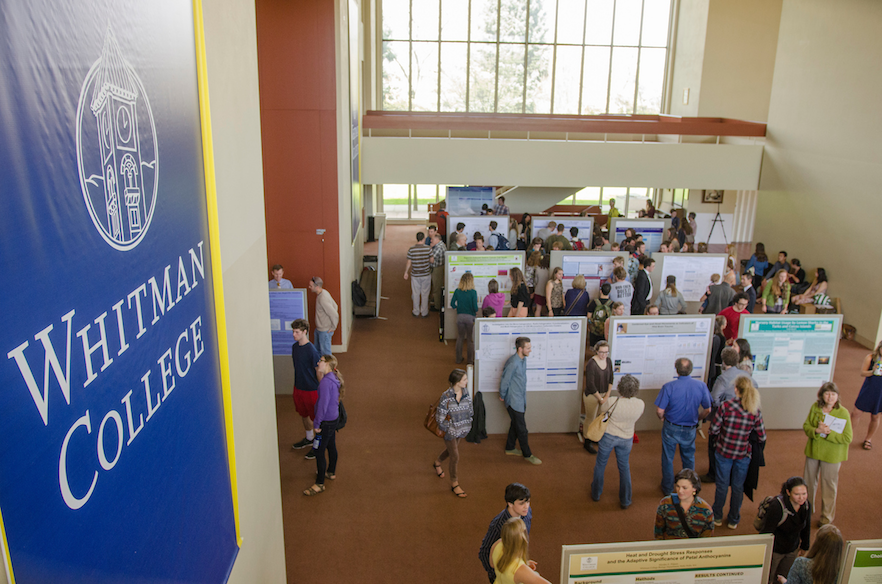Undergraduate Conference spotlights array of academics

From drone photography to digital nomads to pigeon decision-making, the subjects of next week's 19th annual Whitman Undergraduate Conference reflect the range of interdisciplinary research that distinguishes the college.
More than 160 students are slated to participate as presenters and moderators at themed panels such as "Race and Representation," "Diseases and Cures," "Doors of Perception" and "Plant Wars" at the daylong event on April 11.
"It is a day where I really feel the strength of our academic community, both in the wealth of knowledge and also the support from peers who come and watch," said Meghan Ash '17, an anthropology major and one of this year's moderators.
Ash will also present her analysis of Seattle's Law Enforcement Assisted Diversion (LEAD) program at the conference, in a talk called "Turning Points: From Addition and Incarceration to Diversion and Healing."
"One of the things I value most is how the conference affords all the presenters a keener sense of the merit in their work," said Director of Fellowships and Grants Keith Raether, who heads the organizing committee.
"There's a certain seriousness of purpose that comes with their preparation and participation. I think the students begin to see, or see better, what their critical powers and synthesis of information mean in the larger frame."
Students, faculty and other members of the Whitman community are invited to take their pick of talks, poster presentations and special exhibitions featuring projects from every corner of campus. Classes will be suspended as the work students produce in their courses, theses, internships and study abroad takes center stage. Student musicians will play during interludes.
"It's always invigorating when the natural academic order on campus is tilted a bit and students have the chance to inform the rest of us," Raether added. "Every year, I'm struck by the uniqueness of the undergraduate conference as a demonstration of the liberal arts learning experience."
Click here for a complete listing of activities. A sampling follows.
- "Culture, Family and Feelings of Closeness" by Lin Luo '17 (psychology major)
Faculty sponsor: Emily Bushnell, adjunct professor of psychology
Session I: "Culture and Care"
9:30 a.m. in Maxey 104
As part of her study of the differing effects of family configurations within Chinese and American cultures, Luo designed questionnaires addressing the sense of loneliness or closeness in students from one-child or multiple-child families. - "When Refugees Are Terrorists: Racialized Statelessness and the Constitution of the Racial State" by Dennis Young '17 (politics major)
Faculty sponsor: Arash Davari, assistant professor of politics
Session II: "Discrimination and Incarceration"
10:45 a.m. in Olin 138
Young explores how the racial bodies of Syrian refugees may be assigned loaded meanings like "potential terrorists" or national security threats and argues that racialized statelessness provides a lens for contextualization. - "Disease Prevalence: Pedigree Pups Versus Mutts" by Jo Canino '17 (biology major)
Faculty sponsor: Kate Jackson, associate professor of biology
Poster Session
1-2 p.m. in Cordiner Hall
Due to selective breeding, domestic dogs are a diverse species; however, popular breeds are predisposed to inherited disorders. Using data from Walla Walla's Animal Clinic East, Canino scrutinized medical records of 900-plus dogs to correlate pedigrees with diseases. - "Heavy Metal Concentrations and Subfossil Assemblages as Indicators of Environmental Quality in Selected Wisconsin Lakes" by Alex Waheed '17 (geology major)
Faculty sponsor: Pat Spencer, professor of geology
Session III: "Secrets of the Deep"
2:45 p.m. in Science 100
Waheed and collaborators collected and analyzed data from three lakes in Wisconsin—using radiometric dating, sediment analysis, geochemistry and subfossil assemblages—to understand the ecosystems and assess consequences of both pollution and remediation. - "Behind Olive and Dingo: Telling the Story of Portland's Favorite Clowns" by North Bennet '18 (environmental humanities major)
Faculty sponsor: Chas McKhann, professor of anthropology
Session IV: "Development and Economics"
3:45 p.m. in Maxey 104
Bennett screens and then discusses his short documentary, Olive and Dingo, co-produced through the Media Institute for Social Change in Portland, about some of the city's favorite clowns. They struggle to stay true to their punk roots amid an affordable housing crisis.